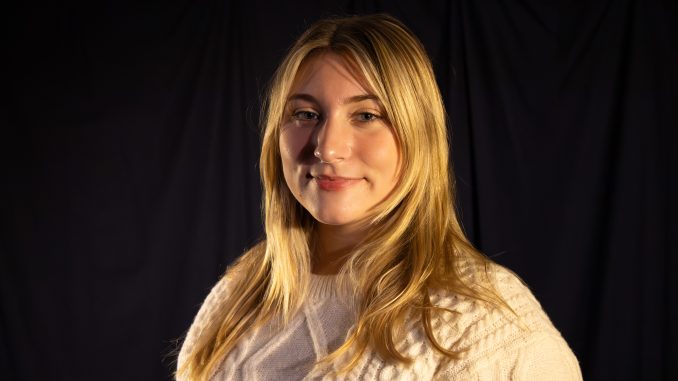
“It’s totally normal; you’re just being dramatic.” These were the words that fell from the mouth of my middle school’s nurse. It was a cold October morning and the second time I’d gone to her that year begging to be sent home. This had become a routine in my day-to-day life; constantly feeling as if my body was turning itself inside out just to spite me, forcing me to live in insufferable pain. I thought it was normal too, because that’s what I was taught to believe.
My friends would say “my periods suck too,” but they’d never understand the battle going on within my body. Every school nurse would call me dramatic, tell me to take a Tylenol and go back to class. Except that was entirely unrealistic for me. The reality I was forced to face would involve constant suffering, routine consultations with specialists, invasive laparoscopic surgery and the long search for pain meds that actually work. I have yet to find a solution.
According to the Office on Women’s Health, “Endometriosis, sometimes called ‘endo,’ is a common health problem in women. It gets its name from the word endometrium, the tissue that normally lines the uterus or womb. Endometriosis happens when tissue similar to the lining of the uterus grows outside of your uterus and in other areas in your body where it doesn’t belong.”
The common misconception surrounding endometriosis is that it simply means painful periods when the reality is near-daily pain that is expected to be brushed off. I remember the nights where I’d lie awake until wee hours of the morning just trying to situate myself comfortably enough to fall asleep. My shouting screams and treacherous tears seemed to express my suffering better than any words ever could.
My parents and grandparents would receive numerous calls from the school asking to pick me up because I was in too much physical pain to concentrate on my work. My teachers would be annoyed each time I asked to go see the nurse because they knew I was not coming back. Eventually, the woman in a white blouse, whose name I can no longer remember, got tired of calling home. “You can go ahead and call for a ride home. I’ll notify your teachers.”
Once high school rolled around, I started to do my own research and ask more questions regarding my symptoms. Only then did I realize my pain was abnormal — the more you know, I guess. The pain was so unbearable and from time to time, I’d even throw up despite having an empty stomach, because my cramps would cause me to lose any appetite I’d previously had. Those rice packs and lavender-scented microwavable Warmies had slowly become an extension of my being. Pop them in the microwave for three minutes and then burn my skin with the blistering hot fabric. For a while, that was my only temporary relief.
In December 2023, I made a personal decision, with the support of my family and friends, to undergo exploratory laparoscopic surgery. I am eternally thankful to have had this opportunity of being properly diagnosed via this procedure, especially at the age of 19.
They confirmed I had endometriosis, and they attempted to remove some of the endometrium tissue. I still experience daily discomfort, but I also have these little scars on my abdomen that remind me I’m not alone in this, and that I made a brave decision in having that procedure.
According to the World Health Organization, approximately 10% of women of reproductive age suffer from endometriosis worldwide. Beyond the negative physical implications, endometriosis affects several aspects of individuals with this disease. Infertility rates range from 30-50% throughout the community, impacting potential plans for starting a family.
Based on statistics, endometriosis is an arguably common chronic illness — and yet we live in a world where saying the words “period,” “blood” or “cramps” will only lead to being shot down. Considering periods are a thing most people with a uterus will experience, and if illnesses like endometriosis and polycystic ovarian syndrome are so prevalent, why does the subject matter make people so squeamish?
The Endometriosis Foundation of America (EndoFound) was created in 2009 by gynecologist Tamer Seckin and activist Padma Lakshmi. EndoFound is a nonprofit organization that “strives to increase disease recognition, provide advocacy, facilitate expert surgical training and fund landmark endometriosis research.”
As detailed in their mission statement, the foundation is “engaged in a robust campaign to inform both the medical community and the public, EndoFound places particular emphasis on the critical importance of early diagnosis and effective intervention while simultaneously providing education to the next generation of medical professionals and their patients.”
Many individuals suffering from endometriosis are struggling to get through daily life, unsure of what is truly going on within their body.
According to the National Library of Medicine, “the diagnostic delay for endometriosis averages between seven to nine years globally, which imparts significant physical, psychological and financial effects on the lives of patients.”
With that being said, I am immensely thankful to have parents who believed my cries of pain and to have doctors who had written “undiagnosed endometriosis” in the margins of their notes for several years. Without the care and concern shown to me throughout my experience, I may not have any of the answers I am so privileged to have now, as I know that the majority of people with endometriosis may wait an entire lifetime before they get to the root cause of their suffering.
